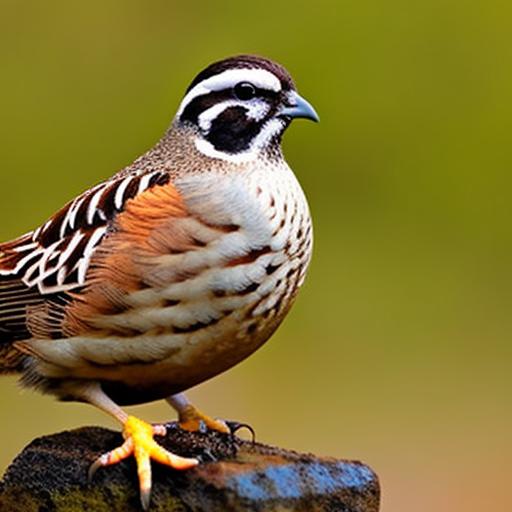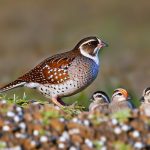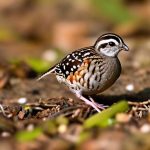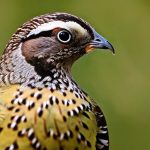Quails are small, ground-dwelling birds that have gained popularity as pets in recent years. They are known for their gentle nature, low maintenance requirements, and charming personalities, making them an ideal choice for bird enthusiasts and pet owners alike. Quails come in a variety of species, with the most common being the Japanese quail, also known as the Coturnix quail. These birds are relatively easy to care for and can be kept in small spaces, making them a great option for those living in apartments or with limited outdoor space.
Quails are known for their social nature and can thrive in small flocks, making them an excellent choice for those looking to keep multiple birds as pets. They are also relatively quiet compared to other birds, making them suitable for urban environments where noise may be a concern. Additionally, quails are known for their beautiful plumage and unique vocalizations, adding a touch of beauty and charm to any home. Overall, quails make wonderful pets for those looking for a low-maintenance, social, and charming bird to add to their household.
Key Takeaways
- Quails make unique and low-maintenance pets, suitable for both indoor and outdoor living.
- Proper housing for pet quails includes a secure and spacious enclosure with access to sunlight and shade.
- A balanced diet for pet quails includes a mix of commercial quail feed, fresh greens, and occasional treats.
- Pet quails are social animals that thrive in small flocks and enjoy interaction with their human caregivers.
- Regular health check-ups and access to a qualified avian veterinarian are essential for maintaining the well-being of pet quails.
- Training and enrichment activities, such as foraging and dust bathing, are important for keeping pet quails mentally and physically stimulated.
- Before getting a pet quail, consider the time, space, and commitment required to provide proper care and ensure a suitable environment for their well-being.
Quail Care and Housing
When it comes to caring for pet quails, it’s important to provide them with a suitable living environment that meets their specific needs. Quails are ground-dwelling birds and require ample space to move around and forage. A spacious enclosure with plenty of room to roam is essential for their physical and mental well-being. The enclosure should also be secure to protect the quails from predators and other potential dangers. Additionally, providing a sheltered area within the enclosure is crucial to protect the quails from extreme weather conditions and provide them with a safe space to rest and nest.
In terms of housing, quails can be kept in a variety of setups, including aviaries, chicken coops, or custom-built enclosures. The flooring of the enclosure should be covered with a soft bedding material, such as straw or wood shavings, to provide a comfortable surface for the quails to walk on. It’s also important to regularly clean the enclosure to maintain a hygienic living environment for the quails. Furthermore, providing perches and hiding spots within the enclosure can help mimic their natural habitat and provide them with opportunities for mental stimulation. Overall, providing a spacious, secure, and comfortable living environment is essential for the well-being of pet quails.
Feeding and Nutrition for Pet Quails
Feeding pet quails a balanced and nutritious diet is essential for their overall health and well-being. Quails are omnivorous birds and have specific dietary requirements that need to be met to ensure they remain healthy. A high-quality commercial quail feed can form the basis of their diet and should be supplemented with fresh fruits, vegetables, and protein sources such as mealworms or boiled eggs. It’s important to provide a varied diet to ensure they receive all the essential nutrients they need to thrive.
In addition to their main diet, providing access to grit and calcium supplements is crucial for quails to support their digestion and eggshell formation. Fresh, clean water should always be available to quails, especially during hot weather or when they are laying eggs. It’s important to monitor their food intake and adjust their diet as needed based on their activity level, age, and overall health. Additionally, providing opportunities for foraging and food enrichment can help stimulate their natural behaviors and prevent boredom. Overall, a well-balanced diet that meets their specific nutritional needs is essential for the health and longevity of pet quails.
Quail Behavior and Socialization
Quails are social birds that thrive in the company of their own kind. They are known for their gentle and docile nature, making them relatively easy to handle and interact with. When kept in small flocks, quails will often form strong social bonds with each other, engaging in activities such as dust bathing, foraging, and vocalizing together. It’s important to provide them with ample space and opportunities for social interaction to ensure they remain mentally stimulated and happy.
Quails are also known for their unique vocalizations, which they use to communicate with each other and express their emotions. These vocalizations can range from soft chirps to loud calls, adding a charming ambiance to any home. Additionally, quails are curious birds that enjoy exploring their surroundings and engaging in various activities such as scratching the ground for food or dust bathing. Providing them with enrichment activities such as hiding treats or providing them with toys can help keep them mentally engaged and prevent boredom. Overall, understanding quail behavior and providing them with opportunities for socialization is essential for their well-being as pets.
Health and Veterinary Care for Pet Quails
Maintaining the health of pet quails is essential for their overall well-being and longevity. Regular health checks and monitoring of their behavior and physical condition can help detect any potential health issues early on. It’s important to provide them with a clean living environment, a balanced diet, and regular access to fresh water to prevent common health problems such as respiratory infections or nutritional deficiencies.
In addition to preventive care, it’s important to have a qualified avian veterinarian who is experienced in treating quails. Regular check-ups and vaccinations can help ensure they remain healthy and free from common avian diseases. It’s also important to be aware of common signs of illness in quails, such as changes in appetite, lethargy, or abnormal vocalizations, and seek veterinary care if any concerns arise. Overall, providing proper preventive care and seeking veterinary attention when needed is crucial for maintaining the health of pet quails.
Training and Enrichment for Pet Quails
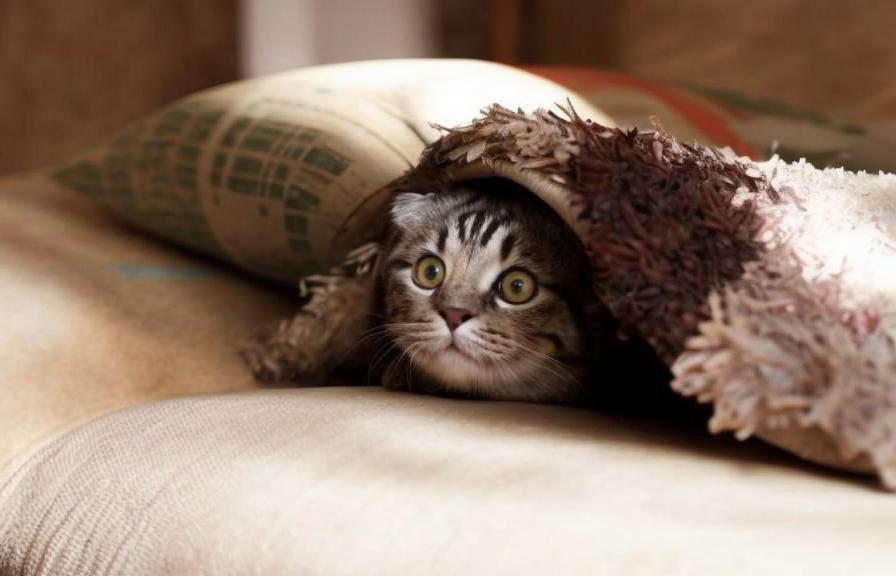
Training and enrichment activities can help stimulate the natural behaviors of pet quails and provide them with mental stimulation. Quails are intelligent birds that can be trained to respond to cues and engage in simple activities such as target training or recall training. Positive reinforcement techniques such as using treats or praise can help motivate them to participate in training sessions.
In addition to training, providing enrichment activities such as hiding treats, providing perches or platforms for climbing, or offering toys can help keep pet quails mentally engaged and prevent boredom. These activities can mimic their natural behaviors in the wild and provide them with opportunities for physical exercise and mental stimulation. It’s important to rotate enrichment activities regularly to keep them engaged and prevent habituation. Overall, training and enrichment activities can help provide mental stimulation and improve the overall well-being of pet quails.
Is a Quail the Right Pet for You?
In conclusion, pet quails can make wonderful additions to households looking for low-maintenance, social, and charming birds as pets. Their gentle nature, beautiful plumage, and unique vocalizations make them a delightful companion for bird enthusiasts and pet owners alike. However, it’s important to consider their specific care requirements, including suitable housing, balanced nutrition, socialization needs, veterinary care, and enrichment activities before deciding if a quail is the right pet for you.
Quail care requires dedication and commitment to providing a suitable living environment that meets their specific needs. Additionally, understanding their behavior and socialization requirements is crucial for ensuring they remain happy and healthy as pets. If you are willing to provide the necessary care and attention that pet quails require, they can make delightful companions that bring joy and charm to any household. Ultimately, the decision to keep pet quails should be made after careful consideration of their specific care requirements and your ability to meet those needs.
If you’re considering keeping a quail as a pet, you may also be interested in creating a suitable living space for them. Check out this article on large chicken coop ideas for inspiration on how to provide a comfortable and secure environment for your quail or other poultry. Creating the right coop is essential for the well-being of your feathered friends, and this article offers valuable insights into designing an ideal living space for them.
FAQs
What is a quail?
Quails are small ground-dwelling birds that belong to the family Phasianidae. They are known for their distinctive calls and are often found in a variety of habitats, including grasslands, woodlands, and agricultural areas.
Can you keep a quail as a pet?
Yes, quails can be kept as pets. They are relatively low-maintenance and can be kept in a suitable enclosure or aviary. However, it’s important to check local regulations and ensure that you have the appropriate space and resources to care for a quail before getting one as a pet.
What do quails eat?
Quails are omnivorous and eat a varied diet that includes seeds, insects, and small invertebrates. In captivity, they can be fed a commercial game bird feed or a mixture of seeds, grains, and greens.
How do you care for a pet quail?
Caring for a pet quail involves providing a suitable enclosure with proper bedding, food, water, and enrichment. Quails also require regular cleaning and maintenance of their living space to ensure their health and well-being.
Are quails social animals?
Quails are social birds and are often found in small flocks in the wild. When kept as pets, they can benefit from being housed with other quails for companionship and social interaction.
Do quails require special veterinary care?
While quails are generally hardy birds, they may still require veterinary care for health issues or injuries. It’s important to find a veterinarian who is knowledgeable about avian care and can provide appropriate treatment for pet quails.
Meet Walter, the feathered-friend fanatic of Florida! Nestled in the sunshine state, Walter struts through life with his feathered companions, clucking his way to happiness. With a coop that’s fancier than a five-star hotel, he’s the Don Juan of the chicken world. When he’s not teaching his hens to do the cha-cha, you’ll find him in a heated debate with his prized rooster, Sir Clucks-a-Lot. Walter’s poultry passion is no yolk; he’s the sunny-side-up guy you never knew you needed in your flock of friends!

